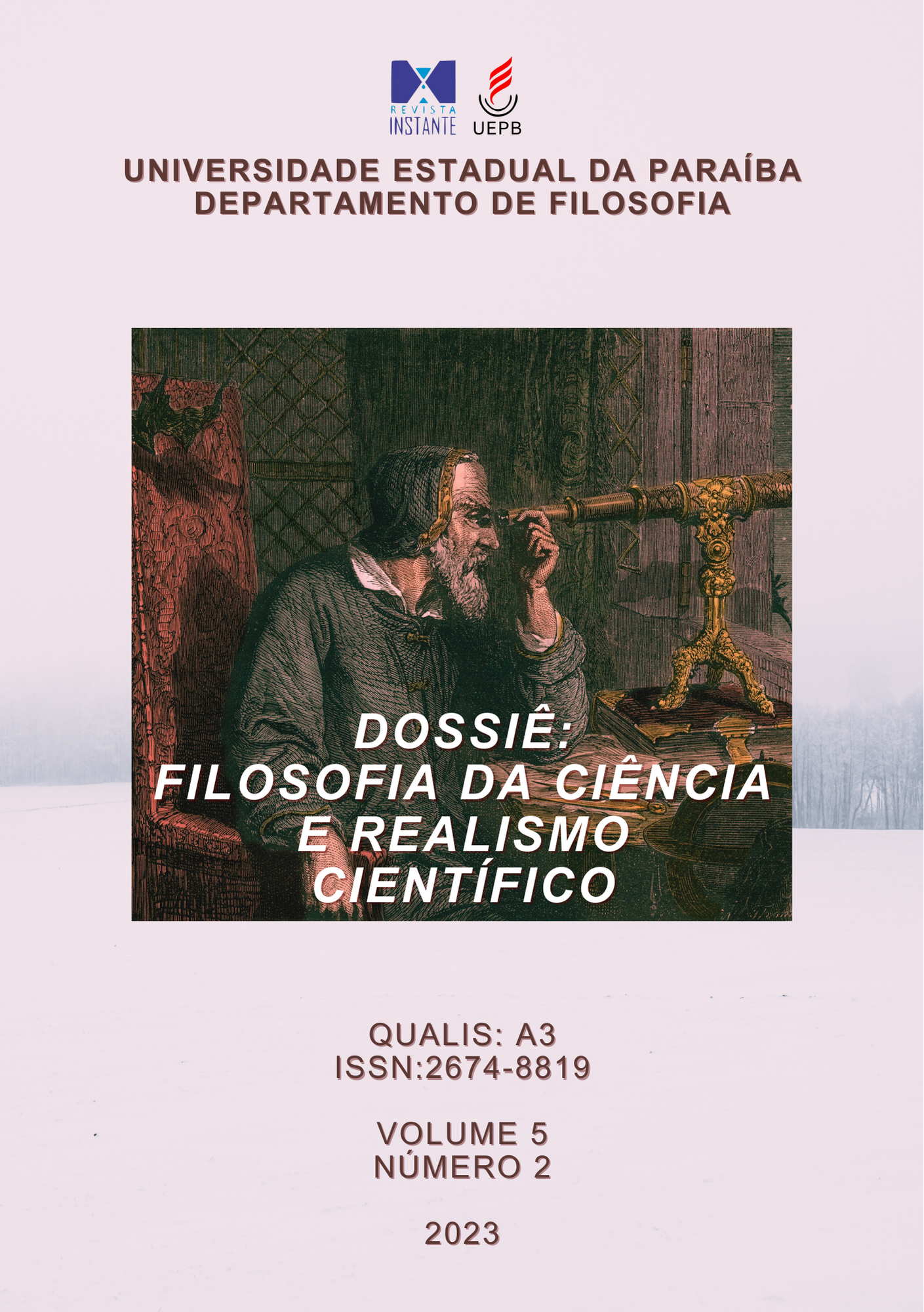TECHNOLOGY:
BETWEEN REALISM AND ANTI-REALISM
Keywords:
Technology. Philosophy. Realism. Antirealism.Abstract
Theoretical discussions about technology have increasingly occupied the agenda of professional philosophers in recent decades, becoming an extremely fertile area, as with each passing day, we are more involved and impregnated by practically technological artifacts and devices, which makes We seek to understand and explain the world around us. I have been discussing the relationship between science and technology for some time and have tried to show a prediction of establishing a weak epistemic emancipation of technology in relation to science. I speak of a weak epistemic emancipation because, in my view, there is not a complete break between science and technology, nor can technology be specified only as applied science. On other occasions (2014, 2015 and 2022), I have already presented the possibility of establishing an emancipation of technology in relation to science based on its methodologies, rationalities, and progress indicators. Now, considering it opportune, to make some comments in relation to realism and anti-realism from the perspective of the philosophy of technology. First of all, it is worth noting that this approach is still quite unique, as in a quick search, it was not possible to find technical works that would lead to this discussion. For me, the philosophy of science presents itself as a privileged starting point in the search for a more adequate understanding of technology itself. For this reason, I sincerely hope that the next lines are, beyond primitive philosophical speculations, minimally valuable considerations. Thus, in short, I argue that technology supports an anti-realism of theories and a realism of entities.
References
BOYD, Richard. Scientific realism and naturalistic epistemology. In: ASQUITH,; GIERE (org.). PSA 1980, v. 2. East Lansing: philosophy of Science association, 1981, pp. 613-662.
__________. The current status of scientific realism. In: LEPLIN, J. (Org.). Scientific Realism. Berkeley e Los Angeles: University of California Press, 1984, pp. 41-82.
BROWN, H. Perception: theory and commitment: The New Philosophy of Science. Chicago-London: The University of Chicago Press, 1977.
BUNGE, Mário. Epistemologia: curso de especialização. São Paulo: Ed. da Universidade de São Paulo: 1980.
CARTWRIGHT. Nancy. How the laws of physics lie. Oxford: Clarendon Press, 1983.
CHAKRAVARTTY, A. Scientific Realism. In: Stanford Encyclopedia of Philosophy. Edward N. Zalta (ed.). Summer Edition. Stanford, CA: The Metaphysics Research Lab, 2017. Disponível em: <https://plato.stanford.edu/archives/sum2017/entries/scientificrealism/>. Acessado em: 08 de agosto de 2023.
CUPANI, Alberto Oscar. The specificity of technological knowledge. In: JERÓNIMO, Helena Mateus. Portuguese philosophy of technology: legacies and contemporay work from the portuguese-speaking community. Springer, Switzerland, 2023.
__________. Ciencia y Valores, Otra Vez: sobre la incorporación de valores no epistémicos en las prácticas científicas. PRINCIPIA (UFSC), v. 25, 2021, pp. 181-197.
__________. A ciência e os valores humanos: repensando uma tese clássica. Philósophos (UFG), v. 9, 2004, pp. 115-134.
DOUGLAS, H. “The value of cognitive values.” Philosophy of Science, 80(5), 796-806, 2013.
__________. “Facts, Values, and Objectivity.” The Sage Handbook of the Philosophy of Social Science. Sage Publications, 2011, pp. 513-529.
__________. Science, policy, and the value-free ideal. Pittsburgh, PA: University of Pittsburgh Press, 2009.
FEIBLEMAN, James. Pure science, applied science, and technology: An attempt at definitions. In MITCHAM, Carl; MACKEY, Robert.: Philosophy and technology: readings in the philosophical problems of technology. New York: The Free Press, 1972.
FEREIRRA, Hadma Souza; RANGEL, Maria do Carmo. Nanotecnologia: aspectos gerias e potencial de aplicação em catálise. In: Quim. Nova, Vol. 32, n. 7, 2009, pp. 1860-1870.
HACKING, Ian. Representing and intervening: introductory topics ind the philosophy of natural Science. Cambrige: Cambridge University Press, 1983.
__________. Representar e intervir: tópicos introdutórios de filosofia da ciência natural. Trad.: Pedro Rocha de Oliveira. Rio de Janeiro: EdUERJ, 2012.
KUHN, T. A tensão essencial: estudos selecionados sobre tradição e mudança científica. Trad.: Marcelo Penna-Forte. São Paulo: 2011.
__________. Objectivity, value judgment, and theory choice. In Thomas S. Kuhn, The essential tension: Selected studies in scientific tradition and change, 320–339. Chicago, IL: University of Chicago Press. 1977.
LACEY, H. . Values and objectivity in science: the current controversy about transgenic crops. Lanham, MD: Rowman and Littlefield, 2005.
__________. Is science value free?: values and scientific understanding. New York, NY: Routledge. 1999.
LACEY, HUGH; MARICONDA, PABLO RUBÉN. O modelo das interações entre as atividades científicas e os valores. Scientiae Studia (USP), v. 12, pp. 643-668, 2014a.
__________. Ciência, valores e alternativas – Apresentação. Estudos Avançados (USP. Impresso), v. 28, pp. 177-179, 2014b.
LAUDAN, L. “The epistemic, the cognitive, and the social.” Science, values, and objectivity, 14-23, 2004.
__________. Science and values: The aims of science and their role in scientific debate. Oakland, CA: University of California Press, 1984.
LONGINO, H. E. “Cognitive and non-cognitive values in science: Rethinking the dichotomy.” In Nelson, LH. & Nelson, H. Feminism, science, and the philosophy of science (pp. 39-58). Dordrecht: Kluwe, 1996.
__________. Science as social knowledge: Values and objectivity in scientific inquiry. Princeton, NJ: Princeton University Press, 1990.
McMULLIN, Ernan. “Values in Science.” PSA: Proceedings of the Biennial Meeting of the Philosophy of Science Association, vol. 1982, 1982, pp. 3–28. Disponível em: . Acessado em:16 de maio de 2022.
MITCHAM, Carl. Thinking through technology: the path between engineering and philosophy. Chicago: The University of Chicago Press, 1994.
SELLARS, Wilfrid. Science, percpection and reality. Londres: Routledge and Kegan Paul, 1963.
SZCZEPANIK, Gilmar Evandro. Conocimiento tecnológico. IN: PARENTE, D.; BERTI, A.; CELIS, C. (org) Glosario de Filosofía de la Técnica. Adrogué: La cebra, 2022.
__________. A relação entre ciência e tecnologia a partir de três modelos teóricos distintos. DOIS PONTOS (UFPR) DIGITAL. , v.12, 2015. pp.185-195.
__________. A emancipação da tecnologia em relação a ciência. (Tese de Doutorado). Universidade Federal de Santa Catarina, Florianópolis, 2014.
VERMAAS, PIETER et al. A philosophy of technology: from technical artefacts to sociotechnical systems. Morgan & Claypool, Eindhoven University of technology, 2011.
VINCENTI, Walter. What engineers know and how they know it. Analytical Studies from Aeronautical History. London: The John Hopkins University Press, 1990.










